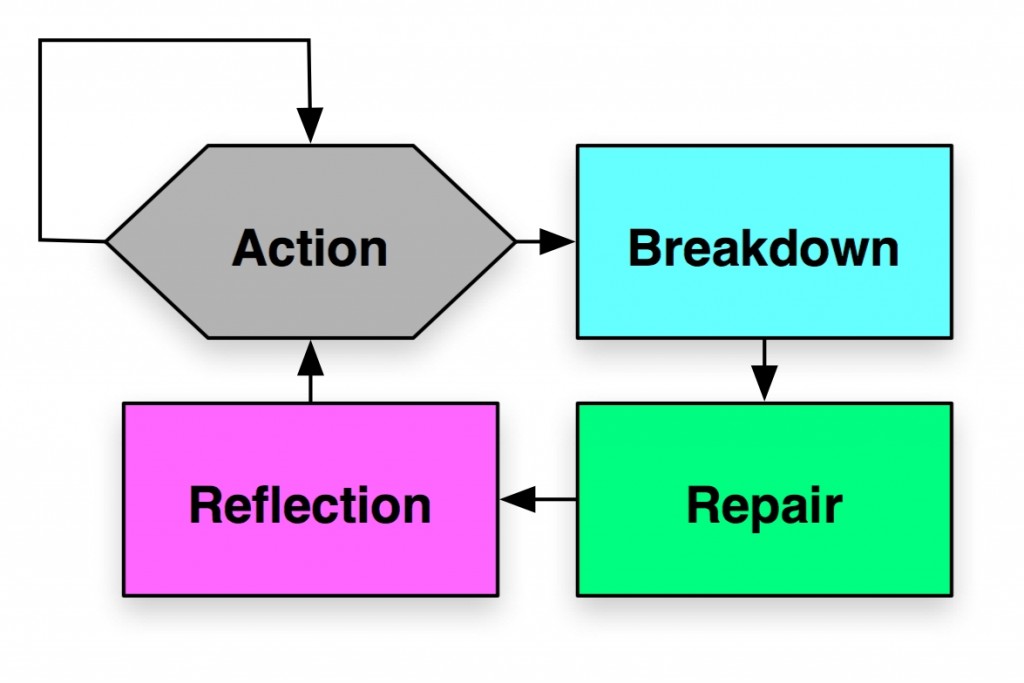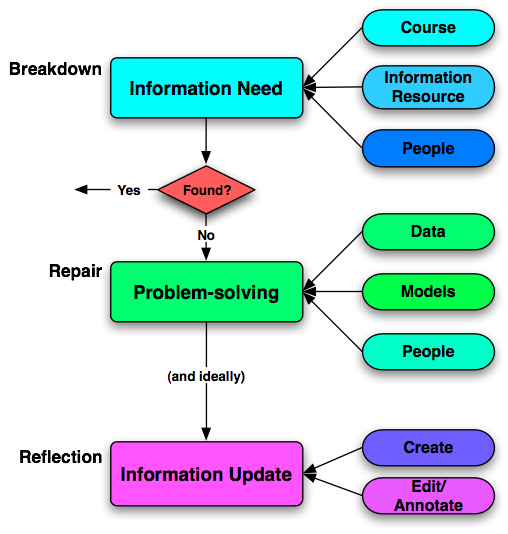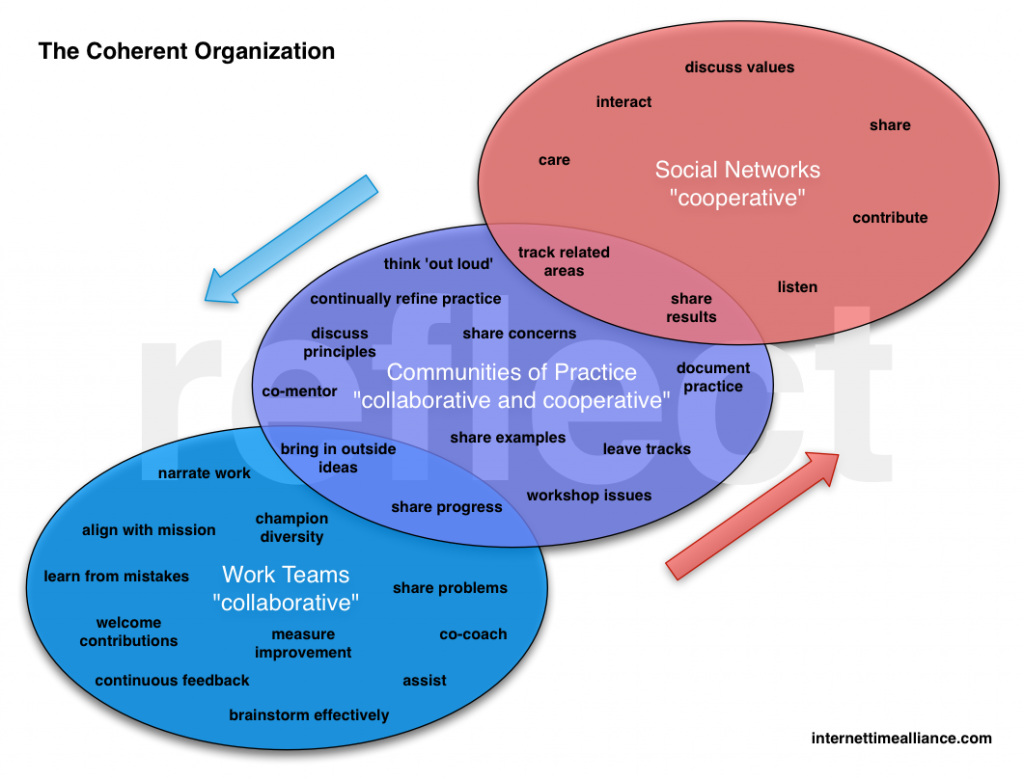I’ve been revisiting performance support in preparation for the Guild’s Performance Support Symposium next month, and I’m seeing a connection between two models that really excite me. It’s about how social and performance support are a natural connection.
 So, let’s start with a performance model. This model came from a look at how people act in the world and I was reminded of it during a conversation on informal learning. Most of the time, we’re acting in well-understood ways (e.g. driving), and we can keep our minds free for other things. However, there may be times when we can’t rely on that well-practiced approach (say, for instance, if our usual route home is blocked for some reason). Then we have a breakdown, and need to consciously problem-solve. Ideally, if we find the solution, we reflect on it and make it part of our well-practiced repertoire.
So, let’s start with a performance model. This model came from a look at how people act in the world and I was reminded of it during a conversation on informal learning. Most of the time, we’re acting in well-understood ways (e.g. driving), and we can keep our minds free for other things. However, there may be times when we can’t rely on that well-practiced approach (say, for instance, if our usual route home is blocked for some reason). Then we have a breakdown, and need to consciously problem-solve. Ideally, if we find the solution, we reflect on it and make it part of our well-practiced repertoire.
 So what I wanted to do was use this understanding to think about how we might support performance. What support do we need at these different stages? I propose that when we have a breakdown, ideally we find the answer, either as an information resource, or from a person with the answer. Some of the time, we might identify a real skill shift we need, and then we might actually take a course, but it’s a small part of the picture.
So what I wanted to do was use this understanding to think about how we might support performance. What support do we need at these different stages? I propose that when we have a breakdown, ideally we find the answer, either as an information resource, or from a person with the answer. Some of the time, we might identify a real skill shift we need, and then we might actually take a course, but it’s a small part of the picture.
If we find the answer, we can go back into action, but if we can’t find the answer, we have to go into problem-solving mode. Here, the support we need differs. We may need data to look for patterns that can explain what’s going on, or models to help find a solution, or even people. Note, however, that the people here are different than the people we would access for the answer. If there were a person with the answer, we would’ve found them in the first step. Here it’s likely to be good collaborators, people with complementary skills and a willingness to help.
If and when we find the answer, then we should share that so that others don’t have to do the same problem-solving, but can access the resource (or you) in the first step. This step is often skipped, because it’s not safe to share, or there’s just not a focus on such contributions and it’s too easy to just get back to work without recognizing the bigger picture. This is one of the components of what Harold Jarche means by ‘narrating your work‘, and I mean in ‘learning out loud’. If it’s habitual, it’s beneficial.
 The connection that I see, however, is that there’s a very strong relationship between this model, and the coherent organization model. At the first step, finding the answer, likely comes from your community of practice or even the broader network (internal or external). This is cooperation, where they’re willing to share the answer.
The connection that I see, however, is that there’s a very strong relationship between this model, and the coherent organization model. At the first step, finding the answer, likely comes from your community of practice or even the broader network (internal or external). This is cooperation, where they’re willing to share the answer.
At the second step, if you get to problem-solving, this is collaboration. It may not just be in a work group (though, implicitly, it is a work group), but could be folks from anywhere. The bigger the problem, the more it’s a formal work group.
The point is that while the L&D group can be providing some of the support, in terms of courses and fixed resources, at other times the solution is going to require ‘the network’. That is, folks are going to play a part in meeting the increasing needs for working. The resources themselves are increasingly likely to be collaboratively developed, the answer is more likely ‘out there’ than necessarily codified in house.
There’s going to of necessity be a greater shift to more flexible solutions across resources and people, to support organizational performance. The performance support model will increasingly require an infrastructure to support the coherent organization. Are you ready?
Clark, enjoyed this post. Another reason people don’t share when they discover a solution is the time it takes to document the solution. I learned process documentation can be both time-consuming and immensely valuable for showing the discovered best ways to do a procedure. Now social media gives us so many options to share information (through LinkedIn Q&As, SlideShare presentations, YouTube demos, blog descriptions, Instagram snapshots and so much more) and so many sites to share with a larger audience that it’s close to negligence if once doesn’t share their solutions and save others grief. I operate remotely without a help desk and am always amazed at the generosity of the techy public in sharing their workarounds and fixes through discussion threads. I have a regular remote work group, but it’s often faster to discover a spontaneous PLN online.
Great post Clark. As a long term evangelist for performance support and a more recent advocate for social, I couldn’t agree with you more. When Gloria Gery described performance support as anything that helps people get work done in context (paraphrased), I’m sure she would have included the social organisation as well had it existed as it does today.
Support from social can come from structured sources “I’ll go out to my specialised community of practice for help” as well as unstructured sources “I’ll go out to everyone and anyone in the network”. The point is that social is real time, it’s in context and that context is work. Social is enabling the democratisation of learning and knowledge by putting the means for content creation and sharing in the hands of employees. Social also facilitates the open identification and sharing of problems that need solving. Problems that may otherwise lay dormant or create ongoing organisational inefficiencies and costs until discovered. Performance support creates a mind set in the individual of self sufficiency when it comes to problem solving and decision making. When a problem is encountered that hinders immediate performance of a task, in a performance support world people will feel free to access all means including social to find solutions. Social provides access to the collective knowledge and expertise of an organisation and a solution is more likely.
I’m incredible excited about the convergence of these models.
Thanks for this, Clark. Your model of the coherent organization is very powerful and offers a concrete ‘grocery list’ for organizations that want to figure out what’s not working in the current practices. Thanks for breaking down the break down (!) and clearly delineating when other people *have* the answer versus when other people *are* the answer. Cheers!